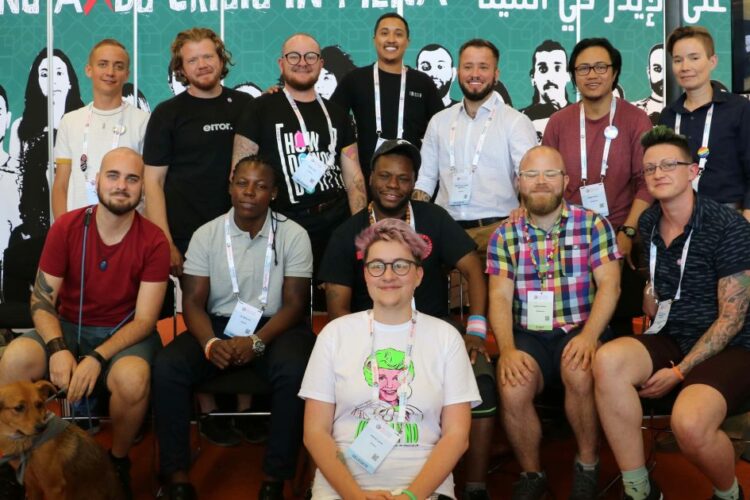In this article we’ll be using the term transmasculine to refer to people assigned female at birth who identify on the masculine spectrum, binary or non-binary. We’ll use the term colonialism to refer to the processes that uphold white supremacy, cisgender heterosexual supremacy and endosex supremacy within epistemological, territorial and economic grounds.
Trans men and other assigned female at birth (AFAB) people have been widely overlooked in HIV and AIDS research This is rooted in the assumptions that are placed on bodies, because of the systemic bias of cisgenderness. Cisgenderness and heterosexuality are culturally ‘‘objective’’ parameters placed upon an understanding of bodies and the symbolic spaces that they’re allowed to inhabit within post-colonial societies. Medicalization has placed genitals as the defining characteristic to identify people’s life trajectories: genders are supposed to be fixed and binary. Any deviation from those parameters is considered culturally pathologized, immoral or illegal. Pathologization of trans identities has contributed to a narrow understanding of people’s complexities beyond their genders. Colonialism, woven into the fabric of pathologization, has played a significant role in defining the current ecosystem in which trans people are globally dehumanized.
Harmful biases around sexuality are rooted in the refusal by medical professionals to acknowledge that people with vaginas can enjoy sex that is not limited to a penis penetrating a vagina. This cisgender heteronormative perspective, which is based on the perceived passive sexual role of all people with vaginas, has affected medical research into people with these genitals, including trans men and other AFAB people. The idea that trans men could engage in the types of sexual experiences that are generally attributed to gay men is not only overlooked but often dismissed completely, as cisgender medical professionals and researchers fail to comprehend this as a possibility, in large part due to the type of genitalia that most trans men are born with. As the 2016 Global Call for Action describes it,
“structural, cultural and social devaluation and the criminalisation of trans lives are the primary drivers of HIV vulnerability in trans communities, and the primary obstacles to a robust response”.
The Durban Declaration, Transgender AND MSM: Trans masculine people who have sex with men claiming our place in the global HIV response (2016)
The continuing failure of medical institutions to acknowledge diverse sexual experiences outside of cisgender or heterosexual norms prevents the centering of transmasculine perspectives within much-needed medical research. This obstructs access to dignified healthcare and serves to further isolate trans men within the global HIV advocacy arena.
Most importantly, these harmful biases contribute to trans people being under-resourced globally, and lacking further involvement in the AIDS response.
A key action that can be taken to overcome these cis-normative patriarchal medical narratives is to prioritize transmasculine-led research. This step is necessary to enable the creation of policies that reflect the values and demands of the communities, by supporting strategic implementation and planning that have the capacity to radically change the current situation that trans men around the world face when attempting to access HIV treatment and care. To this end, GATE coordinates the International Transmasculine People & HIV Working Group, which aims to improve access to HIV prevention and care for transmasculine people and raise awareness of the vulnerabilities and needs of this historically overlooked community within the global HIV response. This group was founded during the AIDS 2018 Conference in Amsterdam as a reaction to the absence of transmasculine inclusion in the overall conference program and the lack of interest and awareness that leading researchers in the field showed towards transmasculine people’s elevated risk and exposure to HIV.
Transmasculine people are not a monolithic entity, but a diverse group that can constitute many key populations. To this date, there have been no HIV-endpoint trials that specifically focus on transgender individuals, and the prevalence of HIV in transmasculine populations of sex workers in the Global South is increasing. While the global issues that connect transphobia to different forms of precarious healthcare are similar in different contexts, each country has its own policy ecosystem and resources.
To counteract the harmful perpetuation of limiting conditions and narratives, communities need access to resources and networking. The AIDS 2022 Conference is a platform that facilitates the connection between stakeholders, scientists, advocates, and policymakers at the global level. Attending the World AIDS Conference is an invaluable opportunity for global exchange, bringing together people from all continents of the world. It is an opportunity to educate industry professionals on what actions have worked in specific contexts and to collectively strategize different entry-points for accessing new medication and advocating for better treatment and policies. It provides a platform for our communities to educate those working in the global HIV response on issues stemming from transphobia, particularly regarding the invisibilization of transmasculine people , and to highlight the necessity of including transmasculine people in research initiatives.
Advocating openly and loudly at the World AIDS Conference has given transmasculine people the attention of critical stakeholders within the field of HIV prevention and research and the opportunity to build strong relationships and collaborations, thus facilitating community empowerment, as well as shifting perspectives from all parties involved.
As trans people, we need to work in alliance with different organizations to achieve meaningful change. We need more transmasculine people in particular to attend the abstract sessions and to take up space in the Global Village. To all trans people, your voices are valuable! To all stakeholders, we encourage you to connect with trans people at the conference, to learn from our experiences and to further your knowledge. To all donors, you provide the fuel that we need in order to continue the immense work that we’re doing, so let’s engage in conversations. Together, we can all work collectively to create an environment that will create concrete and lasting change in the global HIV response.
Visit our TRANSport Hub in the Global Village, and make the most of this opportunity to share experiences, knowledge and resources!






